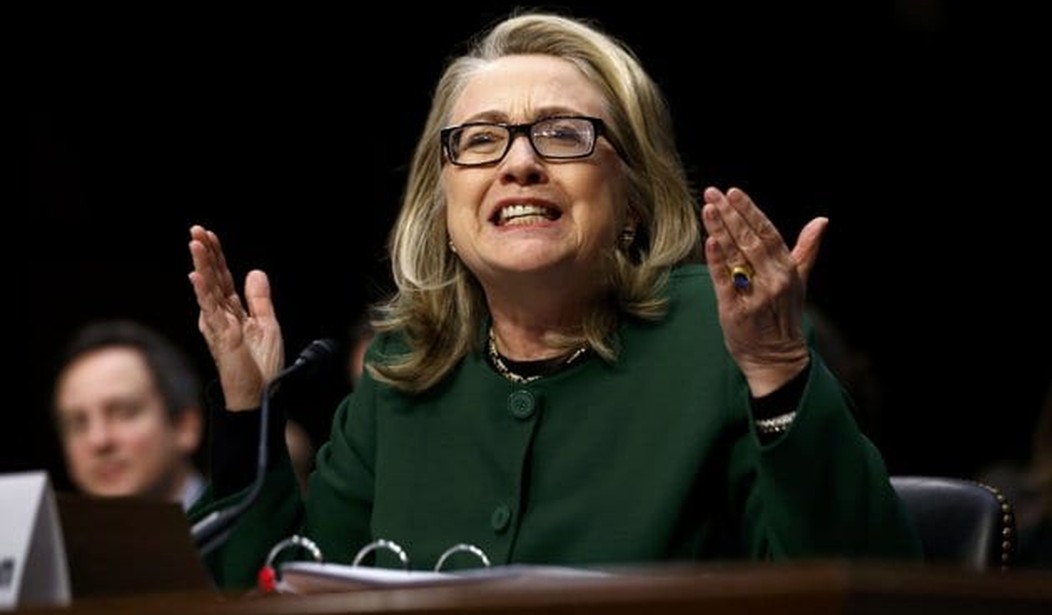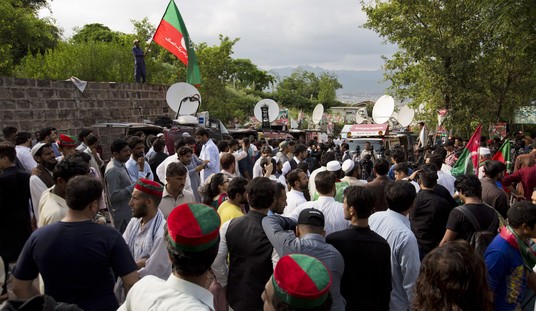After a campaign season of mounting furor over the Obama administration’s twists and turns on the deadly Sept. 11 terrorist attacks in Benghazi, today’s long-anticipated testimony of Secretary of State Hillary Clinton was the bombshell that wasn’t.
Through morning and afternoon hearings before the Senate Foreign Relations Committee and then the House Foreign Affairs Committee, postponed from their original dates because of the secretary’s medical crises, Clinton came prepared to bite back at her challengers and confronted the mere handful of Republicans willing to go toe-to-toe with her.
Then, during the second hearing, administration officials leaked the news that Defense Secretary Leon Panetta would be opening combat roles to women, effectively pulling the Twitter trend away from Benghazi. Over in the House, the “No Budget, No Pay” debt-ceiling deal was passed, putting a third contender for the news cycle in the ring.
And even though he doesn’t sit on the Senate committee, one of the administration’s most notable critics on Benghazi wasn’t even in town: Sen. Lindsey Graham (R-S.C.), a colonel in the U.S. Air Force Reserves, is currently serving in Afghanistan.
“We hope that he’s not held hostage for too long — some of us hope that he is,” Sen. John McCain (R-Ariz.) quipped at a press conference yesterday.
McCain, a new member on the Foreign Relations Committee this Congress, was one of the tougher questioners of Clinton in the first hearing of the day.
“The answers, frankly, that you’ve given this morning are not satisfactory to me,” he said.
“You knew Chris Stevens very well. I knew him very well. I knew him on July 7th when I went to Libya to observe the elections. And at that time, on July 7th, he expressed to me his deep and grave concerns about security, particularly in Benghazi. And he continued to communicate with the State Department, and I don’t know who else was privy to those cables, of his deep concern about the security there and the need for additional assistance.”
Clinton brushed off McCain multitude of questions about who knew what when, why things weren’t included in the investigation, and why the administration is still withholding information as a “disagreement.”
“I understand your very, very strong feelings. You knew Chris. You were a friend of Chris,” she said in reference to the slain ambassador. “You were one of the staunchest supporters of the efforts to dislodge Gadhafi and try to give the Libyan people a chance. And we just have a disagreement.”
Clinton also became noticeably enraged when Sen. Ron Johnson (R-Wis.) questioned her about how “we were misled that there were supposedly protests and that something sprang out of that, an assault sprang out of that.”
“The American people could have known that within days, and they didn’t know that,” Johnson said.
“With all due respect, the fact is we had four dead Americans,” Clinton responded, her voice rising and hands clenched into fists. “Whether because of a protest, or whether because of guys out for a walk one night and decided they’d go kill some Americans. What difference at this point does it make? It is our job to figure out what happened, and do everything we can to prevent it from ever happening again, senator.”
“…It is from my perspective, less important today looking backwards as to why these militants decided they did it, than to find them and bring them to justice, and then maybe we’ll figure out what was going on in the meantime.”
There were some new members on each of the panels thanks to the scandal carrying over from the 112th Congress to the 113th. And on the Senate side, one of those was Rand Paul (R-Ky.).
“I’m glad that you’re accepting responsibility. I think that ultimately with your leaving, you accept the culpability for the worst tragedy since 9/11,” Paul said. “And I really mean that. Had I been president at the time, and I found that you did not read the cables from Benghazi, you did not read the cables from Ambassador Stevens, I would have relieved you of your post. I think it’s inexcusable.”
“Not to know of the request for securities really I think cost these people their lives. Their lives could have been saved had someone been more available, had someone been aware of these things, more on top of the job,” he continued. “And the thing is is I don’t suspect you of bad motives. The review board said, ‘Well, these people weren’t willfully negligent.’ I don’t think you were willfully. I don’t suspect your motives of wanting to serve your country, but it was a failure of leadership not to be involved. It was a failure of leadership not to know these things.”
Later on CNN, Paul — a potential 2016 presidential candidate — took a stab at Clinton’s fitness for future office.
“I think this precludes her and should preclude her from being in a position where she can make these judgment calls,” he said.
On the House side, a second-term member pitched perhaps the harshest lobs at Clinton in a hearing of softballs.
The American people, Rep. Jeff Duncan (R-S.C.) said, are “frustrated when they see comments from you this morning when you said, ‘What difference at this point does it make?’ I’ll tell you what difference it makes. It makes a difference when Americans think they were misled about something for political reasons.”
“Madam Secretary, you let the consulate become a death trap. And that’s national security malpractice,” Duncan said. “You said you take responsibility. What does responsibility mean, Madam Secretary? You’re still in your job, and there are four people at the Department of State that have culpability in this that are still in their jobs.”
“Let me say that we’ve come here and made a very open, transparent presentation. I did not have to declassify the ARB,” Clinton said of the Accountability Review Board report. “I could have joined 18 of the other ARBs of both Democratic and Republican administrations, kept it classified and then, you know, just said goodbye. That’s not who I am. That’s not what I do.”
“The reason we have Accountability Review Boards is so that we take out of politics, we take out of emotion what happened and we try to get to the truth,” she added.
Rep. Dana Rohrabacher (R-Calif.), chairman of the Foreign Affairs subcommittee on Europe, Eurasia, and Emerging Threats, said no members “should at all apologize for trying to get to the nitty-gritty.”
“As you were dealing with the crisis as it went on, did you think, or act on the basis that this was a film protest gone out of control? And when you briefed the president, did you tell him that? Or did you tell him, which Admiral Mullen suggests you knew by then, that this was a well planned and executed terrorist attack? Which was the president told?” Rohrabacher asked Clinton.
“Well first of all, I said the very next morning that it was an attack by heavily armed militants,” Clinton responded. “The president said that morning it was an act of terror. At the same time, however, I was dealing with protests against our facilities that were clearly connected to that video.”
“When you say that we enraged the Islamic terrorists, that means we’re at fault, they’re not at fault. And then to look and see that the only people that I know are in jail right now is the filmmaker. Isn’t this a little disconcerting?” Rohrabacher continued.
“The very next day I called it an attack by heavily armed militants on our compound. I think there is still, however, questions about exactly what caused it, who the attackers were. The ARB, after months of research, said the picture is still very complicated,” Clinton said.
At today’s White House press briefing, spokesman Jay Carney happily sprinted with Clinton’s talking points.
“Whatever was said, based on information provided by the intelligence community on a series of Sunday shows, bears no relevance on the ultimate questions of what happened in Benghazi, who was responsible and what we must do to ensure that it never happens again and that we bring to justice those who killed our diplomats and other Americans,” Carney said to kick off the briefing. “So that is clearly a point that we have been making for a long time and there has been an obvious political obsession over a series of talking points that, again, bears no relevance on the essential issues here as I just innumerate.”
Why wasn’t Clinton on those Sunday shows after the attack instead of UN Ambassador Susan Rice?
“I have to confess here in public, going on the Sunday shows is not my favorite thing to do,” Clinton said at the House hearing. “There are other things I’d prefer to do on Sunday mornings.”
Some lawmakers left as discouraged as before the hearings, lamenting that truth from the administration was still elusive and the solutions were ones they didn’t hear in the hours of testimony and Q&A.
“With growing instability in the Middle East, Northern Africa, and around the world, one clear fact remains: The president’s foreign policies are failing and placing a very real danger on our national security,” said Rep. Joe Wilson (R-S.C.).
“I really do think that we have missed the boat on Benghazi because we’ve been talking about whether or not it had something to do with a film afterwards,” said Paul.
“I think that we need to have a military commander. We need the Department of Defense in charge of security for embassies in a war zone. And nobody has recommended that and I think that’s where the ultimate failure is,” the senator added. “…What we do forward on security for Libya or for other war-torn countries, I don’t think we can treat them like the embassy in Paris. And I still don’t think that realization has sunk in at the State Department. I’m fearful this tragedy could be reproduced or could happen again.”








Join the conversation as a VIP Member